Sokoine University of Agriculture (SUA), Research, Community and Organizational Development Associates (RECODA), Adventist Development and Relief Agency (ADRA) - Denmark, and ADRA - Tanzania, in collaboration with Morogoro Municipal and Mvomero District Councils, have implemented a two-year (Oct 2020 - Sept 2022) pilot project known as Kilimo na Masoko - Farming for the Market project.
It was implemented in seven villages and two wards in Mvomero DC and Morogoro MC respectively. The project involved introduction of the Farmer Market School (FMS) approach to farmer groups which were implementing a project using the Rural Initiatives for Participatory Agricultural Transformation (RIPAT) approach. RIPAT and FMS approaches build the farmers’ capacity to produce and market their crops respectively, and therefore, the combination of the two approaches was aimed at harnessing their combined effect.
The College Principal of Social Sciences and Humanities, SUA, Prof. J.S. Kabote who sat in the middle in a group photo with the stakeholders of the Famers Market School (FMS) project, on the right is the Director of ADRA-Tz Mr. Samuel Oyortey and left are Dr. Dominick Ringo Director of RECODA picture by Daniel Masunzu
The research component of the project aimed at determining the effect of the combination of the FMS approach with the RIPAT approach with respect to income and food security among the smallholder farmers. Specific research questions were: as follows
- Are RIPAT and FMS approaches compatible?
- What effect does the RIPAT-FMS combination have on the income and food security of smallholder farmers?
- What are the determinants of effective RIPAT-FMS combination?
The impact evaluation method, namely propensity score matching was used. A multivariate multiple regression model and in-depth interview were used to analyze the determinants of an effective combination of RIPAT and FMS approaches and assess the compatibility of the two approaches respectively.
Key findings
- RIPAT and FMS approaches are compatible and complementary. When the key elements of the FMS approach are combined with the pillars of the RIPAT approach, influence on their performance occurs both ways; that is, FMS influences RIPAT’s performance and vice versa, and the influence is largely positive
- There is a positive but not statistically significant difference in levels of income among farmers enrolled in project applying both RIPAT and FMS approaches, those under project applying the RIPAT approach only, and non-participants
- Both the combined RIPAT-FMS and RIPAT only interventions have a positive but not robust effect on household food security
- The determinants of an effective combination of RIPAT and FMS: With respect to income, the determinants include: village savings and loan association (VSLA) membership, value addition practices, vaccination of poultry, improved seeds, access to irrigation and collective marketing; With regard to food security (food intake diversity) the determinants are VSLA membership, use of improved feeds and use of improved seeds; The modality of introducing the approaches to the community and climatic changes are also important determinants
Policy implications
- Agricultural interventions ought to integrate both production and marketing aspects in order to enhance households’ food security and income
- Agricultural interventions targeting smallholder farmers need to take into account key factors to increased productivity, income, and food security: access to irrigation, use of improved seeds, use of improved livestock feeds, vaccination of poultry, value addition, collective marketing and savings and lending schemes
- Diffusion of technology: future efforts need to do more on getting things done beyond the demo plots/group training. Currently, there are issues with: Approaches used (e.g. farmer groups – how should a group look like?, group leadership?, are constitutions enforceable?; mindset change – vs strongly held beliefs and practices); Extension (wide extension: farmers ratio, motivation, M&E capacity and guidelines); Institutional and environmental factors (drought, irrigation, marketing)
- This call for Proven approaches, guidelines, lead farmers, motivated extension officers, production & marketing combined
- Based on this research: RIPAT offers some light; Combination of RIPAT and FMS is a good example towards promoting production and marketing
Recommendation on the application of RIPAT
- The basket of options, which is developed during the situational analysis, ought to remain tentative pending the FMS training so that farmers’ choices of production options are well informed by market analysis
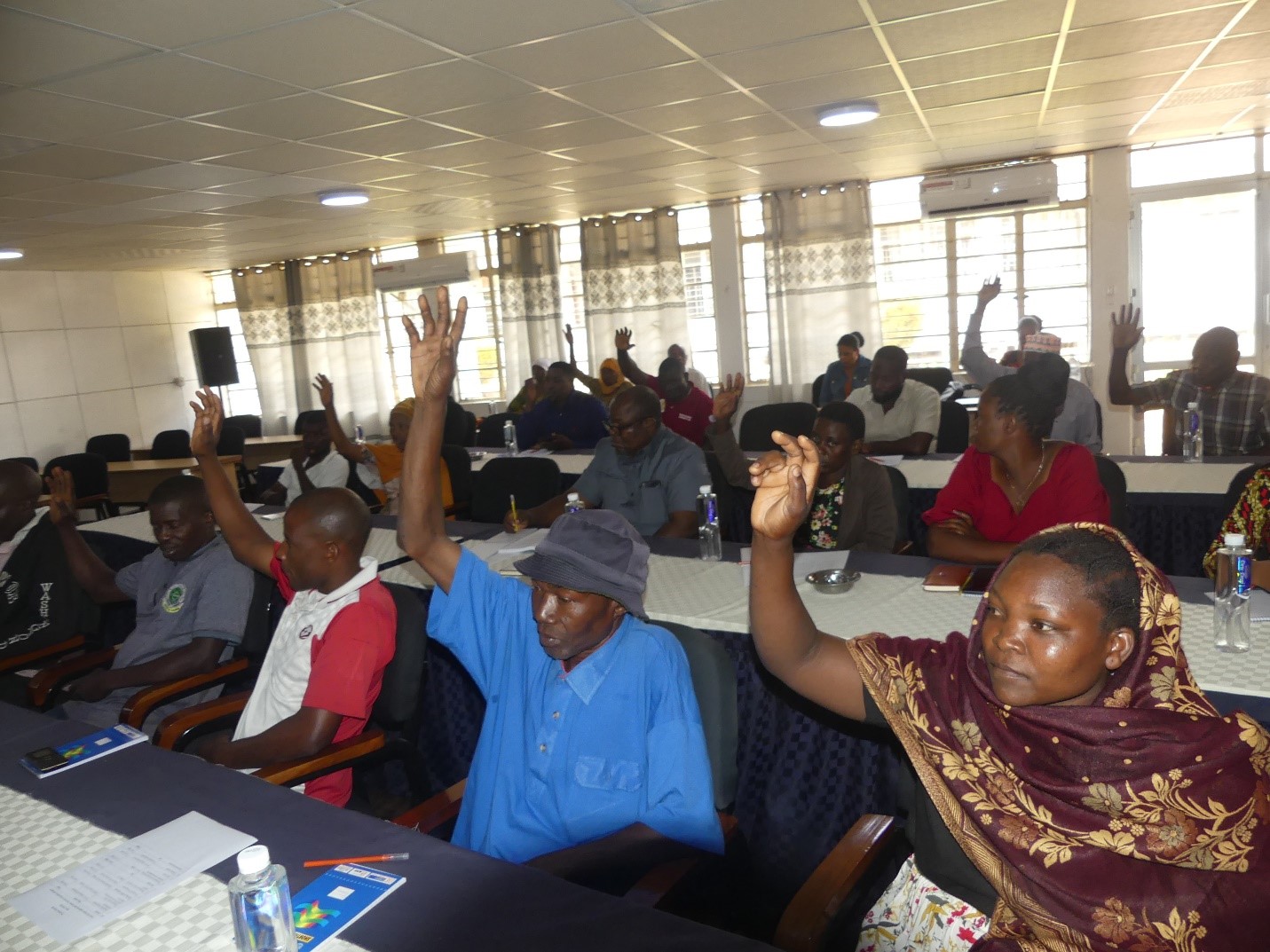
Farmers from Morogoro Municipal Council and Mvomero District participating in validation and lessons sharing workshop
Lesson Sharing
On 23rd September 2022, a workshop was organized to disseminate lessons learned from the project and solicit feedback based on research findings and policy recommendations. The workshop served as an avenue for farmers, researchers, extension officers and representatives from the local government authorities and NGOs to validate, discuss and learn from the results.
In his opening remarks, the Principal of the College of Social Sciences and Humanities, Prof. Samwel J. Kabote, SUA and RECODA have a memorandum of understanding and have collaborated for many years in various activities including research and outreach as exemplified by Kilimo na Masoko project. He mentioned also that, through Kilimo na Masoko project, SUA has collaborated very well with ADRA Tanzania and ADRA Denmark. Talking about the project, Prof. Kabote informed the participants that RIPAT and FMS approaches build the capacity of smallholder farmers to produce and market their agricultural produce thereby increasing their income and enhance household food security.
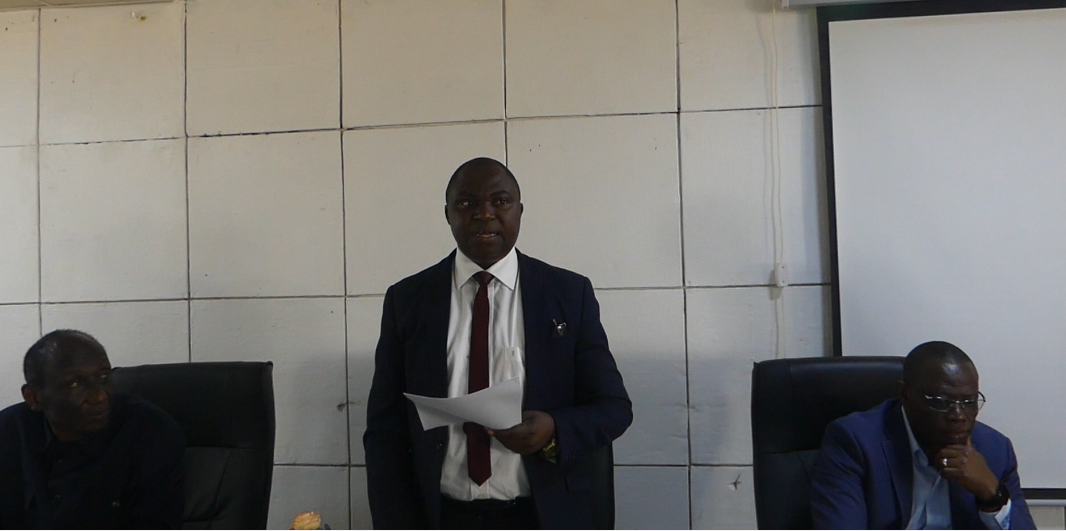
Prof. S.Kabote who standing, during the opening remarks of the workshop
Dr. Dominick E. Ringo is the Director of RECODA. Addressing the workshop participants, Dr. Ringo indicated that the RIPAT approach is already being applied in a number of regions in Tanzania, including Arumeru, Moshi, Ruangwa, Korogwe, Chamwino. Singida Rural and Mvomero; and in some countries including Kenya, Burundi, Rwanda and Nicaragua. He informed the participants that, in all these areas, the project has worked well in bridging the agricultural technology gap.
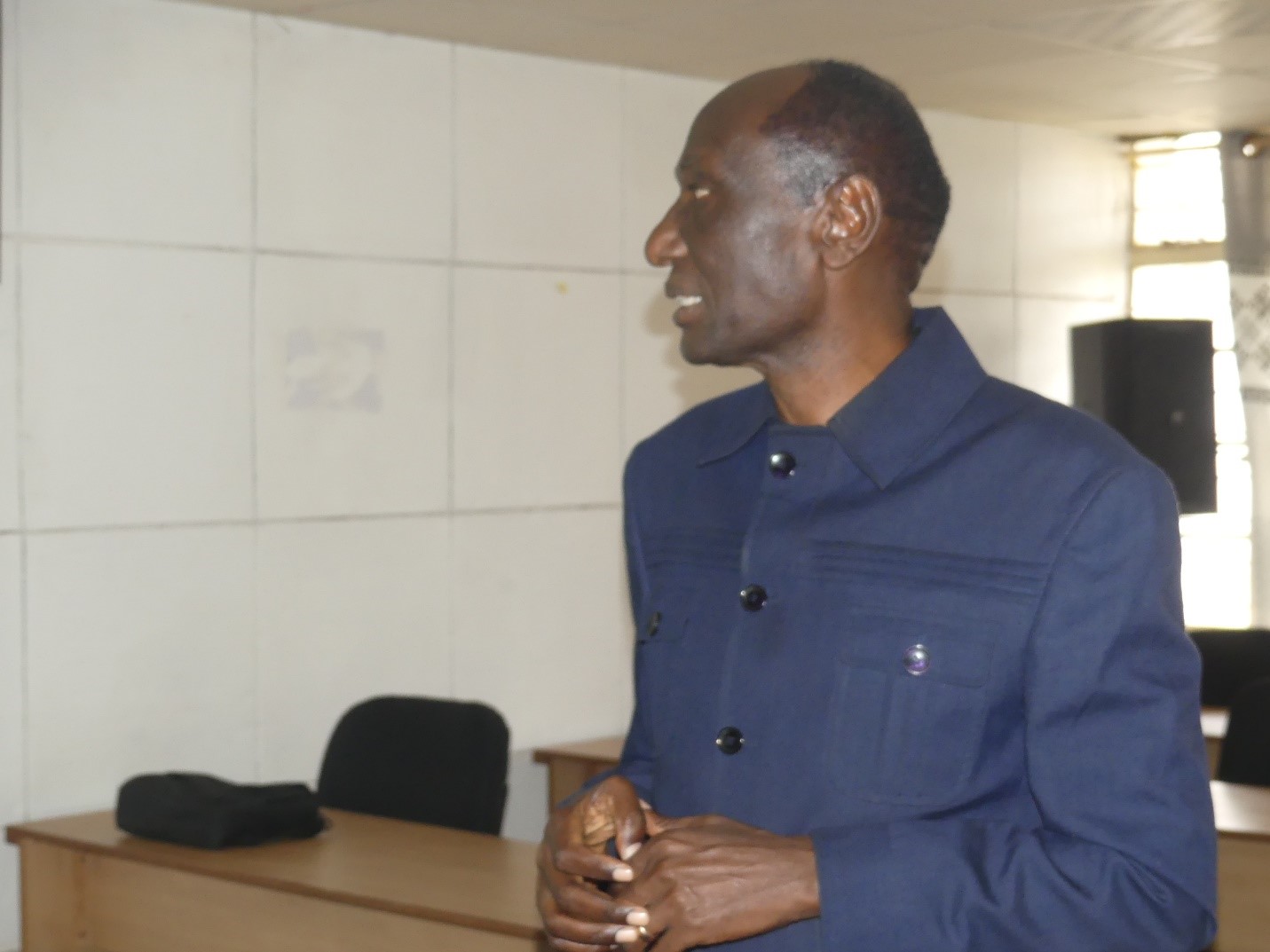
Dr. Dominick E. Ringo, Director of RECODA making a presentation on RIPAT approach
In his presentation on the Farmer Market approach, the Country Director for ADRA Tanzania, Mr. Samuel Oyortey mentioned that the FMS approach has performed well in Malawi, Zimbabwe and Uganda, and that it is currently being piloted in Tanzania through Kilimo na Masoko project.
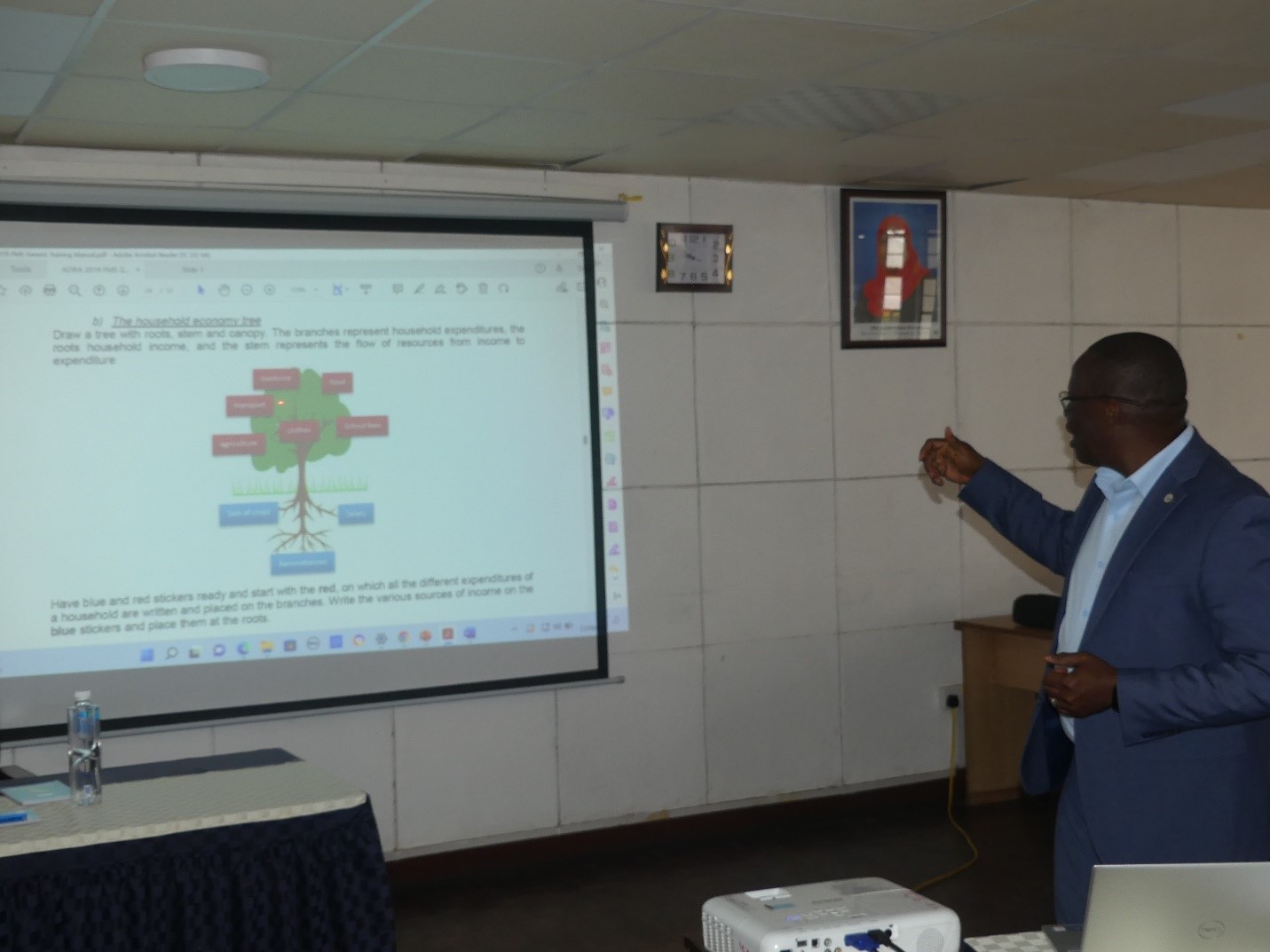
Mr. Samuel Oyortey, ADRA Tanzania Country Director making a presentation on FMS approach

Mr. James, ADRA Tanzania’s Programmes Manager making a presentation on Kilimo na Masoko project
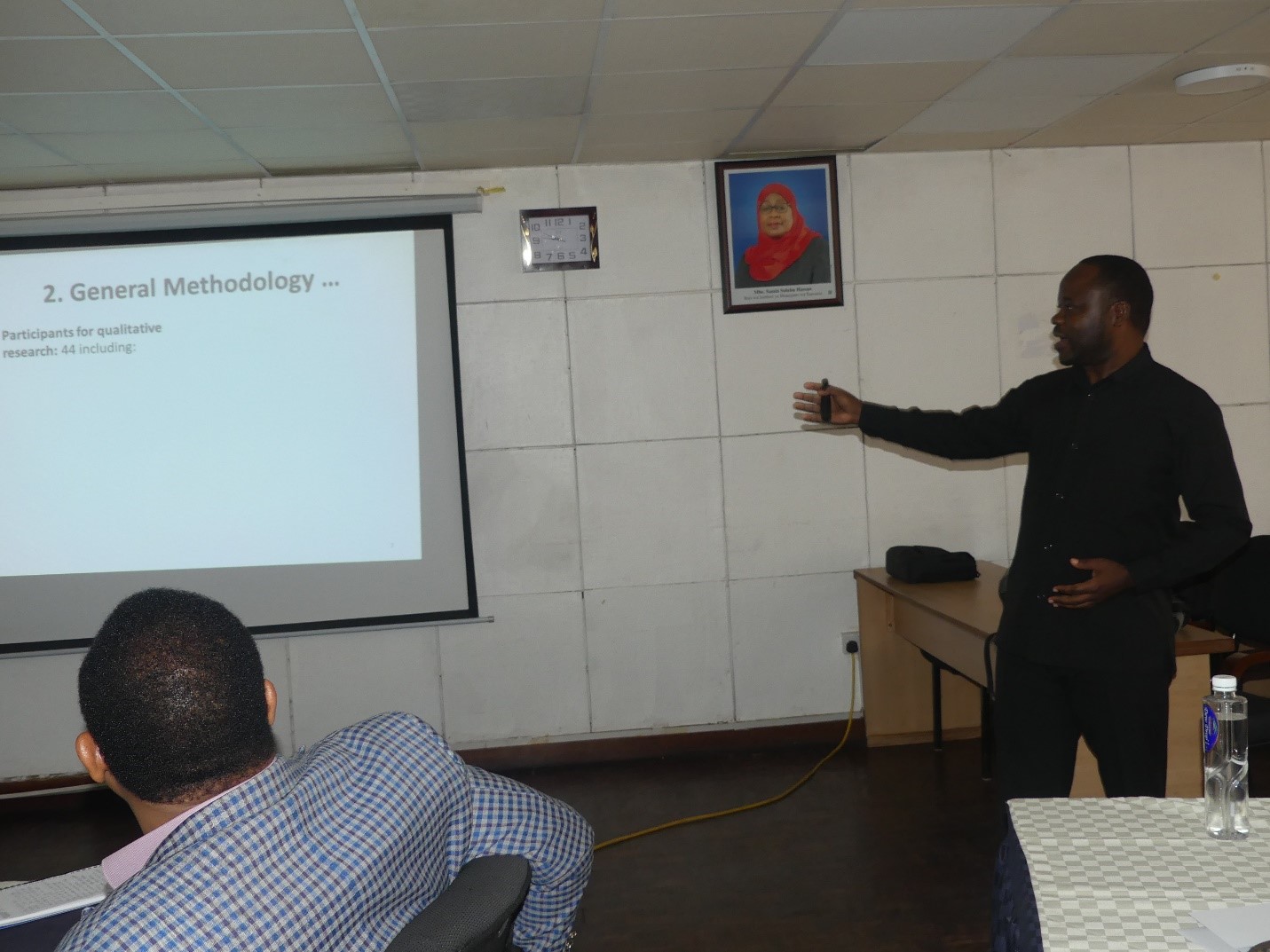
Dr. Emmanuel T. Malisa from the College of Social Sciences and Humanities, Sokoine University of Agriculture, presenting the Kilimo na Masoko research findings
On another occasion, on 8th September 2022, the Sokoine University of Agriculture hosted delegates from ADRA Denmark, ADRA Malawi, ADRA Tanzania and RECODA who were involved in Kilimo na Masoko project monitoring mission. The visitors, who had visited the project area a day earlier, paid a courtesy call to the CSSH Principal, Prof. Samwel J. Kabote and attended a presentation of Kilimo na Masoko (K&M) research findings which was followed by a discussion.
The CSSH Principal informed the ADRA and RECODA delegates that SUA has been collaborating with RECODA for over ten years and that, it started collaborating with ADRA-DK and ADRA-TZ since 2020. Elaborating on the role of SUA in the K&M project, Prof. Kabote indicated that the University was endeavouring to research on compatibility of two approaches namely Rural Initiatives for Participatory Agricultural Transformation (RIPAT) and Farmer Market School (FMS) approaches. Expressing his appreciation on behalf of the University Management, Prof. Kabote indicated that the collaboration was welcome as, in line with SUA’s mission, it addresses one of the farmers’ priority needs, that is, marketing of agricultural produce. He thought the good work being done could be extended to include other nodes of the crop value chain, such as post-harvest management.

Delegates from ADRA-DK, ADRA-TZ and RECODA paying courtesy call to Prof. S.J. Kabote, CSSH Principal. From the Principal (in black suit) to left are Mr. Samuel Oyortey (ADRA Tz Director), Dr. Jens Vesterager (ADRA-DK Secretary General), Mr. Thomas Müller (ADRA-DK Board Chairman), Dr. E.T. Malisa (PI for K&M project, SUA), Dr D.E. Ringo (RECODA Director), Mr. Bjørn Johansen (ADRA-DK Programme Coordinator)
The visitors attended a presentation on Kilimo na Masoko research findings, which was followed by a discussion. In this regard, Dr Malisa presented the findings based on data collected from the project area between 2021 and 2022. Other participants were Dr Denis Matekenya (ADRA-Malawi Country Director), Dr Suzana Nyanda (Project Team member, SUA), Dr Raymond Salanga (Project Team member, SUA), Ms Josephine Ng’ang’a (RECODA Programmes Leader), Ms Namsifuel Mahimbo (K&M Project Manager – RECODA), and Mr Sabato Ario (ADRA-Tz, Manager of Morogoro programmes).

Dr. E.T. Malisa presented the research findings
From the discussion session, the following emerged:
- Indeed, it is important that the situational analysis is informed by market analysis; there is a need for the designing of basket of options to involve more analysis
- There is a need to conduct similar research two to five years later as it is more likely for research to capture the contribution of the interventions to households’ income after such a period. At present, it is too early to realize project’s effect on income. Possibilities of longitudinal study could be considered
- There is a need to consider implementing similar project in different locations where different factors, such as cultural and agro-ecological, would be studied. That is, seeing how combination of RIPAT and FMS works in different localities/under different cultural and agro-ecological factors. Also, two models were implemented in the current project but the study focused on one of the models (1st cohort) only. These are limitations which call for further research
- Future interventions should consider establishing how the intersection point, following RIPAT and FMS combination, can be widened. That is, farmers benefiting the most from both approaches
- Capturing factors that influence the outcome variables (income and food security) is important
- Observations based on seeing farmers’ practices and talking to them show that the interventions have a promising future
- It is important to consider the way the FMS trainings are structured. Farmers’ feedback (as appearing in the full manuscript) to inform this process
- Combining RIPAT with FMS would relegate the farmers’ negative perceptions on operational differences between the two approaches
- A call for continuation of the SUA-RECODA-ADRA collaboration.




